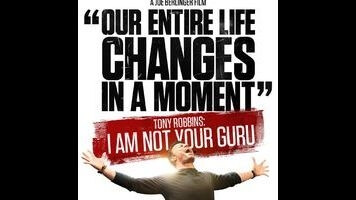I Am Not Your Guru is compelling enough for a glorified Tony Robbins commercial

For anyone familiar with longtime documentary filmmaker Joe Berlinger, there’s a weird sort of suspense involved in watching his latest picture. Tony Robbins: I Am Not Your Guru chronicles “Date With Destiny,” a six-day seminar run several times annually by the obscenely successful self-help author and motivational speaker; this particular event took place in Boca Raton about a year and a half ago. It’s clear right from the jump that Robbins has signed off on the project, so the chance that it’s going to deliberately make him look bad is effectively nil. And Berlinger employs the same verité style that he previously used in movies like Brother’s Keeper and the Paradise Lost trilogy (all co-directed with Bruce Sinofsky, who passed away last year). Consequently, I Am Not Your Guru appears to function as a two-hour advertisement for “Date With Destiny,” which each participant pays a whopping $4,995 to attend. Given Berlinger’s track record, it’s impossible not to wonder if he’s making a stealth exposé, especially given some of the footage included.
Well, spoiler alert: He isn’t. That’s confirmed in the press notes, in which Berlinger explains that he was motivated to make the film following his own transformative experience at “Date With Destiny,” which he attended on a whim after meeting Robbins via mutual friends. But it’s also ultimately evident from Guru itself, which mostly oozes sincerity and uplift, even if certain aspects of Robbins’ approach to changing people’s lives will seem disturbing or ridiculous to skeptics. His specialty is what he calls an “intervention,” and these take up maybe half of the film’s running time, with each one lasting a good five or 10 minutes (reportedly condensed from what might have been one or two hours in the room). Softball interview questions are scattered throughout, along with some peeks behind the scenes, but there’s very little effort to even contextualize the event, much less interrogate it. This is totally consistent with Berlinger’s usual approach, in which viewers are left free to interpret what’s seen as they choose. But if Berlinger spent two hours non-judgmentally filming, say, one of Apple’s Keynote speeches, it’d be hard not to see it as an ad.
That doesn’t mean I Am Not Your Guru is completely worthless, however. The film does at least have the patient rhythm of immersive documentary filmmaking, and it provides a sustained look at exactly how Robbins works with people one-on-one within the context of a large group, which can be fascinating. The interventions, in particular, clearly constitute a hugely powerful moment in the life of whichever person Robbins has chosen to single out from the huge crowd. One woman here tearfully recounts a childhood of nonstop sexual abuse as part of the horrific Children Of God cult, as Robbins silently listens with an expression of infinite compassion. He then tells her what any decent person would tell her: that she’s unbelievably strong; that she didn’t deserve her suffering; that she deserves love and can receive it. The entire room wildly applauds her courage—a standing ovation—and the catharsis she experiences from this outpouring of support is unmistakable and deeply moving. That’s what Berlinger wants to share.
Then again, he gets to cherry-pick the interventions that work, and it would be easy to make an alleged psychic look amazing via selective editing, showing the hits and omitting the misses. Robbins doesn’t come comes across as a charlatan here—he seems totally sincere in his desire to help people, and there’s no editorializing with regard to the fortune he’s amassed doing so, though spoils are glimpsed now and then. It’s up to you to decide whether it’s tough love or peer pressure when Robbins talks a woman into calling her longtime boyfriend and dumping him on speakerphone in front of a roomful of strangers. Opinions will vary, likewise, when it comes to Robbins’ aggressive devotion to traditional gender roles, exemplified by an intervention in which he diagnoses a man as weak and more or less ridicules him into being more masculine—even coaxing him to roar like a lion, via a clearly well-rehearsed story about a lost lion cub raised by sheep. Those waiting for Berlinger to build such moments to a damning or even ambivalent conclusion, however, will wait in vain. At best, the film is a Rorschach testimonial, lionizing its subject while offering enough objectivity to allow non-believers to opt out. At worst, it’s a very long infomercial.